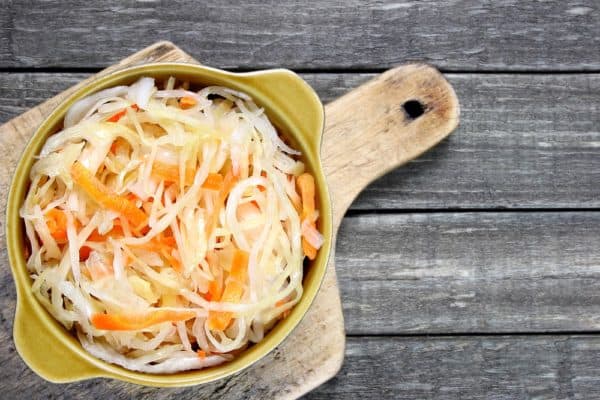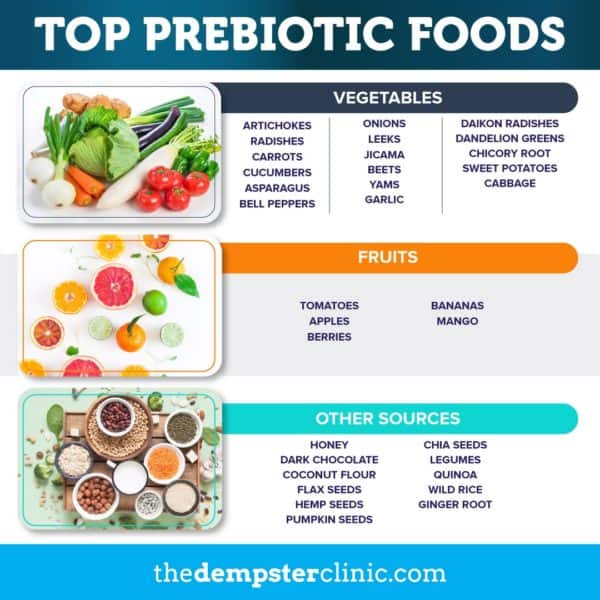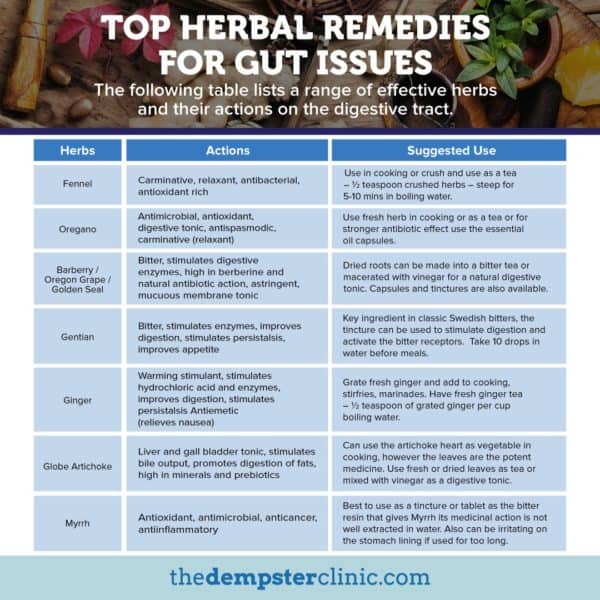Poor gut health can lead to many health concerns that end up causing long-term problems – solution, superfoods. The cause of a leaky gut has to do with increased permeability or intestinal hyperpermeability. There are tight junctions in your gut that keep the stomach contents from passing through the lining of the small intestine. As these junctions loosen, it can cause unintended substances to leak into the bloodstream.
Here are the 6 essential factors for optimal gut function. When these are out of whack, it can lead to the symptoms associated with a leaky gut.

Here are the superfoods I recommend that you add into your diet to help heal your gut.
1. Bone Broth
Bone broth is an animal stock made from boiling bones and herbs on a low simmer for more than 20 hours. It is great for healing intestinal permeability, because of the collagen that seeps out of the bones in the water.
The biggest difference between bone broth and typical chicken or beef stock is that it is from boiling the animal bones rather than only the meat itself. Also, it is cooked for a much longer time than most broths and end up with a thicker consistency.
How to Make Bone Broth
You can make your own bone broth in large batches so you already have it on hand. Make sure you choose 2 pounds of bones that have connective tissues like knuckles, feet, and necks. Also, I recommend you only choose grass-fed beef bones if you are using beef.
To make the broth, place the bones, vegetables of your choice, garlic, and pepper in a large pot. Fill the pot with water and bring the broth to a boil. Once it reaches a rolling boil, bring back to a low simmer and let it cook for an entire day. Store in the fridge and heat it up when you’re ready to drink it.
2. Fermented Foods

There is a long list of fermented foods that are good for your gut health. These foods will increase the good bacteria in your gut and restore gut flora. Here are some of the fermented foods you should consider adding to your diet.
Superfood: Sauerkraut or Kimchi
When you choose sauerkraut, go for the one that is sold in the refrigerated section as it will have more probiotics than canned sauerkraut. Kimchi is made from cabbage like sauerkraut, but it’s spicy.
Superfood: Water Kefir and Kombucha
I don’t recommend dairy products, so as an alternative to kefir, you can choose water kefir. It is similar to kombucha and made with fermented fruit. Kombucha tends to have a higher number of enzymes than water kefir, but the water kefir can be higher in probiotic bacteria strains. Both are beneficial for your gut health.
Superfood: Tempeh
This is similar to tofu, but the biggest difference is that it is fermented. It’s made from fermented soybeans and a good source of amino acids as well as probiotics.
Superfood: Soybean Miso
If you like miso for your soups or salad dressings, choose one made from soybeans. I recommend that you avoid miso made from rice or barley.
3. Vegetables High in Fiber
Fibrous vegetables increase the bifidobacteria in the gut, which helps to maintain a healthy mucus layer in the colon. This layer of mucous can help protect the gut against permeability and keep the gut from leaking into your bloodstream.
Here are high-fiber foods you should consider adding to your diet:

Try to incorporate these foods into your diet as often as you can. It’s best that you eat a variety of foods every day to increase the bacteria in your gut. Also, eat these foods raw when you can for higher fiber. If you want to cook the vegetables, steam them to the point where they are still a bit crunchy.
If you haven’t been eating a lot of fiber in your diet, add in these foods a little at a time. You don’t have to go out and buy everything on the list right away. Just start by replacing some of your choices with these vegetables and try to increase more each week.
4. Oils
There are many oils on the market to cook with, but it’s best for your gut health to choose healthy oils. These include:
- Extra virgin olive oil
- Virgin coconut oil
- Avocado oil
Avoid highly processed oils like corn, canola, hydrogenated or partially hydrogenated oils, or soybean. I also recommend that you avoid dairy-based fats, including ghee or grass-fed butter.
5. Herbs
Herbs can be used to help heal the gut. Here’s a look at the different herbs you should add to your daily cooking and how they can help you.

Find ways to add these herbs and spices into your cooking. Some of these herbs, you can steep in hot water and drink as a tea. For example, grate up ginger and place in boiled water for a few minutes. This is a great hot drink to settle your stomach.
These are a few ways you can heal your leaky gut and feel good again. To help you on your health journey, I invite you to sign-up for my Healthy Gut Institute. In my 6-part course, I’ll take you through exactly what changes you need to put in place to heal your gut.
Join The Healthy Gut Institute
When you join the Healthy Gut Institute, I’ll provide you with recipes and food options that you can use to help heal your gut. Also, I’ll take you through other proven methods to help restore gut flora and heal intestinal permeability.
If you have any questions about our clinic or approach, feel free to sign-up for a complimentary 15-minute discovery session with me. I’d love to talk to you about your condition and answer your questions.


